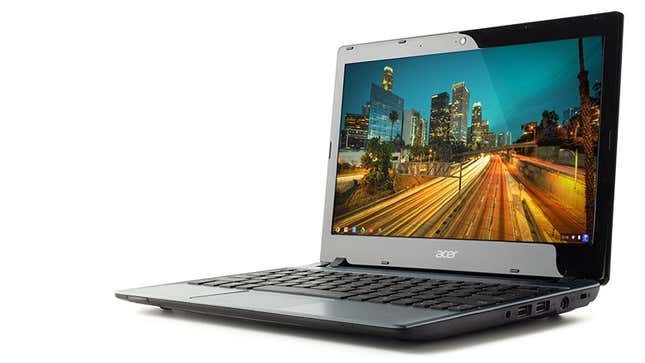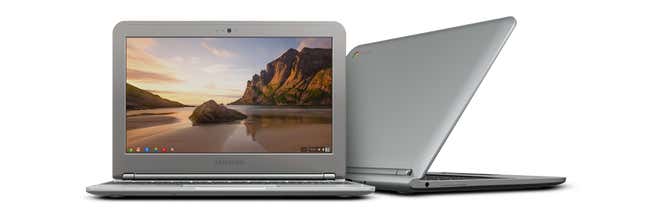
Apple may have invented the tablet computer that now threatens the existence of the PC, but it’s Google, with the help of a variety of hardware manufacturers, that wants to finish off the PC for good.
Today, Google announced a new $199 PC that’s the latest and cheapest in a line of machines that run the Chrome operating system (OS). Unlike Microsoft’s Windows or Apple’s OS X, Chrome OS hardly deserves to be called an OS; it basically consists of a web browser and not much else. The idea behind a Chromebook, as they’re called, is that you do everything through a web browser, using the growing array of web-based apps that have been built to do word-processing, photo-editing and just about anything else you might want to use a computer for. By moving 100% of your computing to the web, you are no longer tied to any one computer. And because everything you use and store is in the cloud, software need never be updated, and, absent a snafu on Google’s end, data can never be lost.
The new Chromebook is manufactured by Acer, the Taiwan-based manufacturer better known for laptops that run Windows. But here’s the funny thing about it: In many ways it’s inferior to its cousin, an even more web-centric device announced in October, known as the Samsung Chromebook.

The difference between the two is that the new Acer C7 is still a traditional PC, albeit one not running Windows. It has an Intel processor, the same workhorse that has powered PCs for a generation, and a capacious, spinning, 320-gigabyte hard drive. Samsung’s device has the same kind of processor, made by Intel competitor ARM, that appears in almost every smartphone and tablet on earth, and a mere 16 gigabytes of solid-state (flash) memory, like a smartphone or tablet. In every respect save its laptop-like appearance, the Samsung Chromebook isn’t a PC; it’s a mobile device.
What’s more, the Acer C7 may have a faster processor and bigger hard drive, but it’s bulkier, has a battery life 2-3 hours shorter and, for many tasks, it’s slower. When booting up, loading apps and switching tasks, solid-state drives are noticeably faster than regular ones. Reviewers have observed that Samsung’s laptop does a lot more with its “limited” hardware than a one-to-one comparison with a PC would suggest.
So why did Google just release an inferior machine based on dated technology?
Probably because, although Samsung’s Chromebook has in its short life become the most popular PC on Amazon.com (indeed, it’s sold out), Chromebooks as a whole have been slow to take off since they first went on sale in mid-2011. Most people, it seems, aren’t yet ready to move to Google’s somewhat radical vision of computing’s future. Even if Google is much less likely to lose your data than you are, there’s something comforting about having your own hard drive with your own stuff on it. The thought of relying on the cloud has led to a sort of “range anxiety” for computer users, analogous to the anxiety some drivers feel about the limited range of electric cars—only this is anxiety about being out of range of a wifi signal. For people who are used to trusting the Intel brand and evaluating laptops based, in part, on the size of their hard drives, the Acer C7 is comfortingly familiar, even if it doesn’t run Windows.
In other words, the latest Chromebook is like training wheels, or more cynically, a Trojan Horse. If Google can lure cost-conscious buyers or tech buffs with a spare $200 to spend with this ultra-cheap laptop, it can train them to think of a PC less as a home for storing your life than as a window for viewing it. And that, of course, gives Google a good deal of control over what you see through the window.